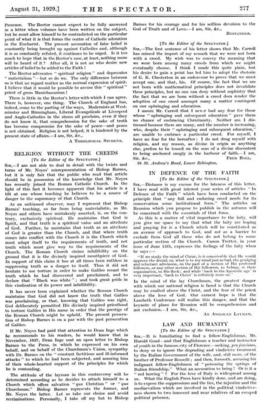• RELIGION WITHOUT THE CREEDS [To the Editor of the
SPECTATOR.]
Sta,—I am not able to deal in detail with the twists and turns of Mr. Noyes' misrepresentation of Bishop Barnes, but it is only fair that the public who read that article should be in possession of the knowledge that Mr. Noyes has recently joined the Roman Catholic Church. In the light of this fact it becomes apparent that his article is a tilt at one whose teaching he believes to be a source of danger to the supremacy of that Church.
As an unbiassed observer, may I represent that Bishop Barnes' teaching, so far from being materialistic, as Mr. Noyes and others have mistakenly asserted, is, on the con- trary, exclusively spiritual. He maintains that God is Spirit, and that truth is a spiritual value and an attribute of God. Further, he maintains that truth as an attribute of God is greater than the Church, and that where truth comes into conflict with the Church it is the Church which must adapt itself to the requirements of truth, and not truth which must give way to the requirements of the Church. The Roman Church claims infallibility on the ground that it is the divinely inspired mouthpiece of God. In support of this claim it has at all times been ruthless in suppressing truth as a danger to itself. Thus it did not hesitate to use torture in order to make Galileo recant the truth which he had discovered and proclaimed, and to declare that "Black was white " ; and took great pride in this vindication of its power and infallibility.
It has never been explained whether the Roman Church maintains that God did not know the truth that Galileo was proclaiming, or that, knowing that Galileo was right, God deliberately permitted His divinely inspired priesthood to torture Galileo in His name in order that the prestige of the Roman Church might be upheld. The present persecu- tion of Bishop Barnes is on a par with the past persecution of Galileo.
• If Mr. Noyes had paid that attention to Dean Inge which he recommends to his readers, he would know that in November, 1927, Dean Inge sent an open letter to Bishop Barnes to the Press, in which he expressed on his own behalf, and on behalf of the Churchmen's Union, sympathy with Dr. Barnes on the "constant factitious and ill-informed attacks" to which he had been subjected, and assuring him of their whole-hearted support of the principles for which he is contending.
The attitude of the layman in this controversy will be determined according as he decides to attach himself to a Church which offers salvation "qua Christian" or "qua Churchman." Bishop Barnes repres.mts the former, and Mr. Noyes the latter. Let us take our choice and avoid recriminations. Personally, I take off my hat to Bishop
Barnes for his courage and for his selfless devotion to the God of Truth and of Love.—I am, Sir, &c., BYSTANDER.
































 Previous page
Previous page